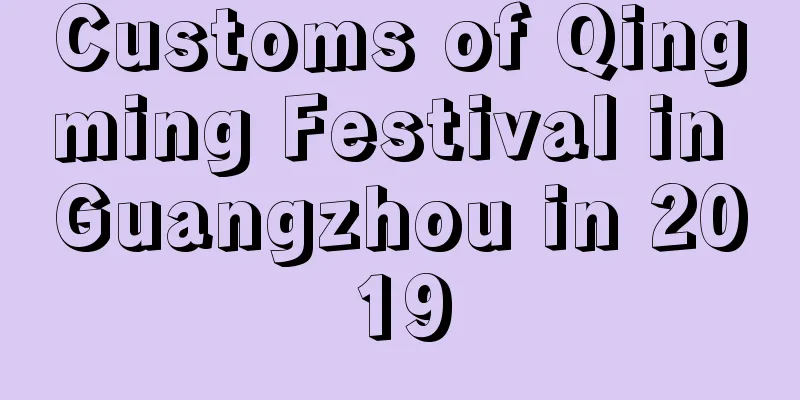Customs of Qingming Festival in Guangzhou in 2019

|
Qingming Festival is a traditional festival in my country, and the customs of this festival are different across the country. So what are the customs of Qingming Festival in Guangzhou? Let’s take a look at it together below. Customs of Qingming Festival in Guangzhou in 2019 Swing This is the custom of Qingming Festival in ancient my country. Swing means moving by holding a leather rope. It has a very ancient history. It was originally called Qianqiu, but later it was changed to swing to avoid taboos. In ancient times, swings were mostly made of tree branches as frames, tied with colorful ribbons. Later it gradually developed into a swing with two ropes and pedals. Swinging can not only improve health, but also cultivate courage. It is still loved by people, especially children. Cuju Ju is a leather ball made of leather and stuffed with hair inside. Cuju is kicking the ball with the feet. This was a favorite game during the Qingming Festival in ancient times. According to legend, it was invented by Huangdi and its original purpose was to train warriors. Outing Also called spring outing. In ancient times, it was called Tanchun, Xunchun, etc. During the Qingming Festival in March, spring returns to the earth and nature is full of vitality. It is a great time for an outing. The Chinese people have long maintained the custom of outing during the Qingming Festival. Planting trees Around the Qingming Festival, the spring sun shines, the spring rain falls, and the survival rate of planted seedlings is high and they grow fast. Therefore, my country has had the custom of planting trees during Qingming Festival since ancient times. Some people also call Qingming Festival "Arbor Day". The custom of planting trees has been passed down to this day. In 1979, the Standing Committee of the National People's Congress designated March 12 of each year as my country's Arbor Day. This is of great significance in mobilizing people of all ethnic groups across the country to actively carry out activities to green the motherland. Flying a kite It is also a favorite activity among people during the Qingming Festival. During the Qingming Festival, people set off fireworks not only during the day but also at night. At night, strings of colorful lanterns are hung under the kite or on the wind-stable pull line. They look like twinkling stars and are called "magic lanterns." In the past, some people would cut the strings after releasing the kites into the blue sky and let the breeze carry them to the ends of the earth. It was said that this would ward off disease and disaster and bring good luck. Tomb sweeping Tomb sweeping during Qingming Festival is called "respect for ancestors". The custom has a long history. The Ming Dynasty's "A Brief Account of Scenery in the Imperial Capital" records: "On the Qingming Festival in March, men and women sweep tombs, carrying urns, with paper mulberry sticks hung behind sedan chairs and horses, filling the streets with people. Those who worship, pour wine, cry, and weed and add soil to the tombs burn paper mulberry sticks and place paper money on the grave. If there is no paper money in sight, then the grave is an isolated one. After crying, people do not go home, but instead go to fragrant trees and choose gardens, where they sit and get drunk." In fact, tomb sweeping existed before the Qin Dynasty, but it was not necessarily on the Qingming Festival. Tomb sweeping on the Qingming Festival is a practice that happened after the Qin Dynasty. It only became popular during the Tang Dynasty. "Tongli of Qing Dynasty" says: "Every year, on the Cold Food Festival and the Frost Descent Festival, people visit the graves and tombs. On the appointed time, they wear plain clothes and go to the tombs, bringing wine and food, as well as tools for cutting grass and trees. They trim the trees and cut the weeds, so it is called tomb sweeping." This custom has been passed down to this day. Planting willows It is said that the custom of planting willows is also to commemorate Shennong, the ancestor of agriculture who "taught people how to farm." In some places, people insert willow branches under the eaves to predict the weather. There is an old saying that goes "When the willow branches are green, it will rain; when the willow branches are dry, the sky will be sunny." When Huang Chao started the uprising, he stipulated that "Qingming Festival would be the date and wearing willow trees would be the signal." After the uprising failed, the custom of wearing willows gradually faded away, but planting willows remained popular. Willows have strong vitality. As the saying goes, "If you plant flowers with care, they may not grow; but if you plant willows by accident, they may grow into shade trees." Willow branches will grow wherever they are planted. If you plant willows every year, shade trees will grow everywhere. |
<<: Sagittarius male personality traits What are the differences between Sagittarius males
>>: Auspicious dates for marriage in April 2019
Recommend
A poetic name for a boy with the surname Ji
To select a poetic name for a boy with the surnam...
Test your future significant other to see if you will have enough blessings in the future?
While we are suffering now, we all hope to enjoy...
What songs are good for Mother's Day? Recommended classic songs for Mother's Day in 2017
What song is good for Mother's Day? The annua...
Detailed explanation of Tui Bei Tu: Tui Bei Tu with annotations by Jin Shengtan in vernacular Chinese (Part 6)
The very famous and mysterious prediction book &q...
Tang Liqi's daily horoscope 2018.03.22
You may find that in some ways you work better un...
12 constellations girl's Qixi date outfit matching manual belongs to your perfect date
This weekend we will usher in the annual Chinese ...
A boy's name with a more fashionable surname
Chinese culture is profound and extensive, and Ch...
Zhou Gong's Dream Interpretation: Is it good to dream about quarreling with others?
What does it mean to dream about arguing with oth...
List of auspicious days and times for April 18, 2018
How about getting married on April 18, 2018? Is A...
Constellation matching index: These constellations are more harmonious the more they get along.
Everyone has the possibility of falling in love w...
Pisces 2013 Horoscope and Fortune: How to overcome difficulties
At the beginning of the year, you should organize...
Test your superpowers to see what kind of brain you have
If you participate in a lottery on an online plat...
Capricorn Daily Horoscope 2016.0809 Romantic Surprise
Destiny is in the hands of the strong, not decide...
Boys' names with the character "Xuan"
A name is a birth gift given to us by our parents...
What foods should be eaten during Qingming Festival in 2019?
When Qingming Festival comes, many seasonal foods...









